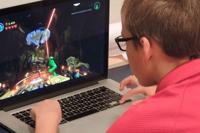
Too much sreen time affects children's health.(AHA)
Last year, when Andrea Paez noticed her younger son was developing a dark patch on his neck, she took him to his pediatrician.
The doctor confirmed this was caused because he was overweight and the dark patch was the result of high blood sugar.
“The doctor said it was probably because he was living a sedentary life,” said Paez. “Then I realized it was true. My child was spending a long time playing video games, eating a lot of junk food and mostly sitting down.”
The child, who was then 13 years old, was supposed to weigh about 120 lbs, but was weighing 145.
Paez said she immediately took action and changed his eating habits and the family started to exercise. Now her sons, who are 14 and 16, spend time with her, cycling or doing any other form of exercise.
A year has passed and Paez has been able to see the difference and the benefits of staying away from the screens. She said she allows them some time at night after doing their homework.
Excessive screen time
Paez’s experience coincides with a recent study that revealed that excessive screen time for children is associated with higher cardiometabolic disease risk.
Children and young adults can develop diseases like high blood pressure, high cholesterol and insulin resistance, according to the Journal of the American Heart Association.
The study that included over 1,000 participants in Denmark revealed that children were being more affected because the screen was stealing time from their sleeping schedule. Screen time included time spent watching TV, movies, gaming or using phones, tablets or computers for leisure.

Andrea Paez and her two children. (Courtesy of Andrea Paez)
In 2023, the American Heart Association (AHA) indicated that cardiometabolic risk is increasing at a younger age. Only 29% of American youth, ages two to 19 years, had favorable cardiometabolic health based on 2013-2018 data from the National Health and Nutrition Examination Survey.
Dr. David Horner, lead author of the study, said that limiting discretionary screen time in childhood and adolescence may protect long-term heart and metabolic health.
“Our study provides evidence that this connection starts early and highlights the importance of having balanced daily routines,” said Horner, who is a researcher at the Copenhagen Prospective Studies on Asthma in Childhood (COPSAC) at the University of Copenhagen in Denmark.
What to do?
Dr Juan C. Alejos, medical director of the Pediatric Heart Transplant/Cardiomyopathy Program at UCLA, agrees with Horner.
He said if children and young adults don’t change their sedentary habits, they could follow them to adulthood.
“It’s because those habits have already been ingrained,” he said. “So instead of reaching for, let's say, an apple, you reach for a bag of potato chips and you make poor choices in terms of what you're going to eat as you get older.”
Dr. Alejos said he encourages parents to combine activities. For example, go for a family walk, a dog walk, a picnic in the park. Any activity that requires movement, even if it’s for 30 minutes a day.
According to the American Academy of Pediatrics, two hours of screen time a day is a good goal for children.
“My encouragement would be to kind of reduce the amount of time that children are having isolated screen time activities and don’t have the potato chips or candies available in the house,” he said.
Alejos said he tells his patients they can eat healthily during the week. It is always OK to have a cheat meal on the weekend when they can eat something they really like.
The doctor said that eating healthy and exercising regularly should become part of the children’s lives.
“In [many] cases, it helps reduce their stress level. It helps reduce their anxiety. It helps them socialize. If they do team sports, it helps them socialize and make friends,” he said.












(0) comments
Welcome to the discussion.
Log In
Keep it Clean. Please avoid obscene, vulgar, lewd, racist or sexually-oriented language.
PLEASE TURN OFF YOUR CAPS LOCK.
Don't Threaten. Threats of harming another person will not be tolerated.
Be Truthful. Don't knowingly lie about anyone or anything.
Be Nice. No racism, sexism or any sort of -ism that is degrading to another person.
Be Proactive. Use the 'Report' link on each comment to let us know of abusive posts.
Share with Us. We'd love to hear eyewitness accounts, the history behind an article.